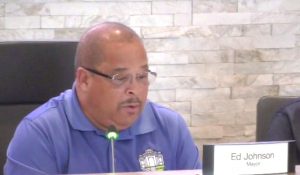A proposal to the Fayetteville City Council at the Feb. 26 retreat outlined what could be the next large development in West Fayetteville. This time it is the “residential component” across from Pinewood Atlanta Studios first mentioned a year ago.
The annexation and rezoning request will be heard beginning later in March.
Pinewood Forest, the temporary name for the development, would include a total of 1,238 residential units, a 200-room boutique hotel and 175,500 sq. ft. of mixed use, office and retail space.
Pinewood Forest is one part of a larger plan that is the subject of a Development of Regional Impact (DRI) proposal submitted to the Georgia Department of Community Affairs (DCA) on Feb. 27 by Pinewood Atlanta Holdings, LLC.
While the DRI portrays potential development that will occur over the next seven years, a presentation at the council retreat on Feb. 26 provided the first look at a proposal – the residential component of the overall Pinewood Atlanta project – that could get off the ground in the coming months and be constructed in phases.
The proposed residential and retail development was presented by Pinewood Atlanta Studios project manager and Group VI Principal Jim Pace, Rick Halbert of Halbert Development and architect Bill Foley.
The project, referred to a year ago by Pace as “Seaside on steroids,” is temporarily being called “Pinewood Forest.” That name will change as the project unfolds.
Pinewood Forest is essentially the residential component envisioned for the larger Pinewood Atlanta project announced at the 2014 council retreat when the studio complex on Veterans Parkway was in its beginning stages.
With all phases combined, Pinewood Forest would be the site of 714 single-family homes, 324 multi-family units, 200 apartments, a 200-room boutique hotel, 75,000 sq. ft. of mixed use retail and 100,500 sq. ft. of mixed use/office/retail.
As the residential component, Pinewood Forest will be situated on approximately 225 acres on the east side of Veterans Parkway immediately north of Hood Road and directly across the road from the 288-acre studio complex. A portion of the property, situated on the north side of the 225 acres, will be the subject of an upcoming annexation request.
Pinewood Forest is a response to a shortage of housing in Fayetteville and Fayette County resulting from the emerging Pinewood Atlanta Studios economic engine that is generating jobs, said Foley.
Foley said the proposal is in keeping with the New Urbanist model of development that includes significant connectivity within a walkable community. The residential development is expected to attract a range of homeowners, from Millennials to empty-nesters, and provide housing for some of the students who will be attending the nearby Georgia Military College currently under construction, Foley said.
That connectivity, including a possible tunnel under Veterans Parkway, is planned to extend to other portions of the 1,200 acres annexed into the city’s west side in 2013.
To be developed in several phases, Foley said the first phase of Pinewood Forest totaling 55 acres would be on the south side of the property. Approximately one-third of the property, situated at the rear of the site, is largely wetlands and will be left as it is today.
The portion of the Pinewood Forest property adjacent to Veterans Parkway will be the site of the proposed commercial portion of the development along with a number of live-work offerings. The area is also proposed to include a boutique hotel that will not be part of a hotel chain. The same applies for the restaurants in the development, Foley added.
Essentially a village within a city, Foley said developers are speaking with national builders with experience in village settings.
Foley emphasized that Pinewood Forest would not be a gated community, rather it will one that is open to the community so residents can take advantage of the retail and park offerings and the large horseshoe-shaped central park that will include water features, moving water and a small amphitheater and chapel that will be a “community center.”
“We want to set up an organic village that will grow,” said Foley.
The bulk of the residences will be single-family homes and will include a variety of lot sizes. Foley said the homes will range from 1,300-3,500 sq. ft.
Pinewood Forest will be a wired community to support the live-work village, said Foley. He said the office component will follow the residential.
Plans call for the Pinewood Forest development to have two main entrances on Veterans Parkway and potential point of entry along Hood Road.
“We’ve got to do a better job matching economic engines to housing to address transportation problems,” said Pace, explaining the advantage of pairing job-generating areas with commercial offerings in a manner that provides walkable connectivity with residences and community amenities. “A community is either vibrant and moving forward or it continues to decay. Where we’re falling down is in housing.”
A portion of Pace’s comments at the retreat addressed an agenda item that preceded the Pinewood Forest announcement. That agenda item dealt with the city’s current exploration of another TAD (tax allocation district) area for development, with this one centered in one or more locations in the 1,200-acre West Fayetteville area.
“We’re not advocating for a TAD. We’re doing what we do without a TAD,” said Pace.
Looking to the future of the West Fayetteville area and all of Fayetteville, Pace said that, like Seaside, Florida, Fayetteville can become a “brand of its own” that is walkable, connected and vibrant.
“We’re proposing a bold initiative. This (development) is different and there will be a fear factor,” Pace said, citing what he referenced as the decline of Fayette’s cities. “Progress stops dead in its tracks if we keep things the way they are.”
Pace noted that the increasing emergence of Fayetteville is linked not only to Pinewood Atlanta, but also to factors such as Georgia Military College, Piedmont Fayette Hospital and the potential placement at Pinewood Atlanta of the upcoming Georgia Film Academy.
“The area will expand, and we don’t want to have to drive to Atlanta to go to work,” said Pace.
The area, he said, extends beyond the boundaries of West Fayetteville and can include the revitalization of downtown Fayetteville.
Asked by council members about a time table for beginning the initial phase of Pinewood Forest, Pace said, “We’re ready to start.”
The proposal for the first phase of the Pinewood Forest development is expected to be heard by the Fayetteville Planning Commission later this month and by the City Council in April.
The DRI proposal, one that requires approval by the Atlanta Regional Commission (ARC) and the Georgia Regional Transportation Authority (GRTA), shows a planned development consisting of film studio facilities, production center, office, commercial, residential, hotels and institutional uses that includes 2.265 million sq. ft. of studio, retail and office space and 1,345 residential units on nearly 700 acres spanning the east side of the 1,200 acres annexed into Fayetteville in 2013.
The multiple projects included in the DRI carry an estimated completion date of 2022.













Leave a Comment
You must be logged in to post a comment.